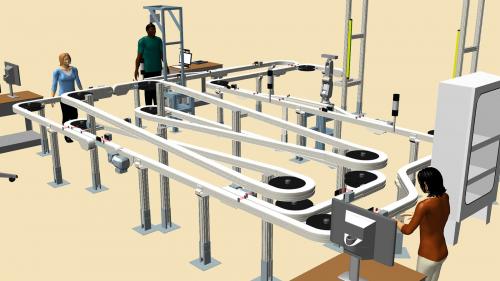Smart Design and Manufacturing Pilot
An OCET Advanced Manufacturing Program project

Performer: Siemens Government Technologies
Project leader: Jason Spiegler
Contract value: $1,784,674
Project dates: June 2021 – March 2023
Project goal: To implement advanced industrial software for digital design and an automated manufacturing production demonstration line for regulatory science use, supporting broader industry adoption of smart design and manufacturing processes in FDA-regulated products.
Why it's important: Furthering the adoption of new advanced manufacturing technologies can help increase U.S. manufacturing capacity, increase supply chain resilience, and decrease time to market for medical diagnostics, therapies and vaccines that are needed for public health emergency response.
Manufacturing supply chains are long, often spanning thousands of miles. They are also complex, with many steps and suppliers required to make one product. These factors become even more influential in the medical products industries where access to products and product quality are paramount to patient safety. The FDA Office of Counterterrorism and Emerging Threats (OCET) and the Center for Devices and Radiological Health (CDRH) have identified smart design and manufacturing as a set of technologies that could have potential transformative applications across the breadth of FDA’s regulated products, and are working together to showcase how digital design technology and digital management of manufacturing can improve medical product manufacturing and benefit public health.
OCET and CDRH jointly supported a contract with Siemens Government Technologies to provide a smart (digital) design and an automated manufacturing production demonstration software package and conveyor line. This project will give FDA access to a full suite of products from Siemens Digital Industries Software’s Xcelerator portfolio including:
- A suite of manufacturing, product lifecycle development, and modeling software;
- Process design modeling and simulation; miniature assembly line;
- Closed loop quality management;
- Industrial Internet of Things (IIoT); and
- User stories that show the implementation of a fully digital product lifecycle implementation.
They will be connected to a physical conveyor line and demonstration system providing a hands-on link to real-world sensors and personnel training opportunities. Internal and external research collaborations on the regulatory science benchmarks, metrics, and needs of systems using these types of technologies will help create publicly available information and FDA internal expertise to appropriately and transparently review these processes.
The pilot will aim to facilitate industry adoption of smart design and manufacturing processes in FDA-regulated products. Through the pilot, FDA centers can apply the knowledge gained from their collaborative research in the I-TEAM Hub on these cross-cutting applications to product-specific reviews and use it to bolster their own advanced manufacturing programs.
Smart design and manufacturing encompass many technologies integrating edge sensors, computational control, modeling, high levels of adaptability, and the ability to make rapid design changes through digitally connected systems. These have the potential to:
- Improve the efficiency of manufacturing,
- Make it easier to achieve exceptional levels of safety and quality,
- Increase supply chain resilience, and
- Expand access to many critical medical products.
The technologies and processes that go into building smart manufacturing systems vary by application but work on principles that are similar between vendors and across industries.
In the future, long PDF files may give way to digital twins showing the exact production process, components, and performance of products. The detailed information, combined with streamlined processes could help regulators like FDA better understand how product, manufacturing, and supply chain changes can help facilitate faster access to lifesaving medical countermeasures.
This project was funded by the OCET Advanced Manufacturing Program, in collaboration with CDRH.
Related links
- Siemens awarded $1.78M FDA contract to showcase advanced digital design and manufacturing (company press release, October 1, 2021)
